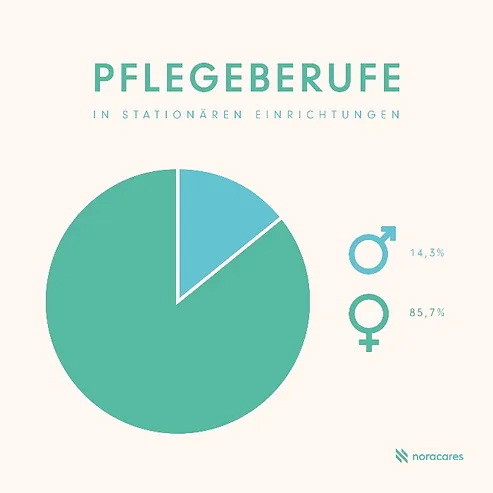Nursing professions for men - a vocation with a future
Have you ever thought about helping people and making a real difference? Caregiving is more than just a job - it's a calling. And although many people think that nursing is something for women, these professions offer countless opportunities for men too.
Stefan, 23, discovered his passion for care during his community service at a care facility for people with disabilities. "I couldn't be happier about my decision," he says. "I was deeply touched by the gratitude of the people I was able to help."
But why are nursing professions still so strongly associated with women?One reason is certainly that nursing was long considered a typically female domain. But times are changing. More and more men are discovering the diverse opportunities that nursing care offers. Markus, a former competitive athlete, brings his physical strength and stamina to the table as an intensive care nurse. David, an engineer, develops innovative care aids.
In the past, nursing was often the domain of women. But times are changing! Although around 85% of nursing staff are still female, the proportion of men is growing steadily. This shows that nursing is a profession for everyone who wants to help people. As a man, you can contribute your own strengths and play an active role in shaping the future of care.
Austria needs nursing staff!
Due to the demographic changes of this time, also known as the "ageing" of the population, mainly thanks to modern medicine, the number of people in need of care in Austria naturally increases with age - and therefore the need for those who care for them. According to a forecast by Gesundheit Österreich GmbH, almost 200,000 additional nursing and care staff will be needed by 2050.
However, if you include those nurses in the equation who are slowly but surely starting their well-earned retirement, the result is an even more gigantic sum: 275.000 new nursing staff will then be needed in the country. A huge number of people who need to be attracted to the nursing profession! This fact alone makes it clear that care can no longer remain a purely women's issue.
Career orientation of boys
Career orientation usually takes place between the ages of 15 and 18. During this period, young people decide what they want to be when they grow up and what career path they want to take.
While this period is a time of decision, it is also a time of puberty. And it is precisely this that throws a spanner in the works for young men's careers.
According to the Institute for Men's and Gender Studies in Graz, teenage boys in particular want to distinguish themselves and clearly stand out from girls and prove their masculinity. Choosing a social profession that is still dominated by female colleagues does not fit in for many of them.
While school textbooks, job advice brochures and co. are already increasingly depicting women and girls in overalls for technical professions, men in nursing uniforms are still a clear rarity. Is it therefore necessary to appeal more to stereotyped female professions as a means of raising awareness of men? Or does the mere fact of being depicted in a book make little difference to the boys?
Pragmatic approach?
While women and girls prefer to discuss a "why" and "wherefore" ten times, men and boys prefer to think pragmatically. It therefore makes sense to ask specific questions to find out which men act as role models for boys of vocational age. A research report from the Public Employment Service in 2018 shows that self-reflection is important for men in order to come to terms with their role in society. After all, social professions cannot be replaced by robotics or automated systems.
Career decision after training
Even after completing their school education, young men have often not yet made a career decision. In this position, it can be beneficial if boys opt for civilian service instead of the army. The responsibility of working in a social profession and actually helping people with their own actions has motivated most men in the care professions to make their final career choice.
So did Stefan, 23, who laid the first building block for his career as a carer with his community service in a care facility for people with disabilities. "I was never really sure what I would become one day - for a long time my plan was to study computer science and become a programmer, I always found that exciting."
However, during my time in community service, I gained experience and knowledge and experienced gratitude that made me decide between the two professions very quickly. I couldn't be happier about my decision.
Stefan is just one of many who feel comfortable in the role of helping hand during this nine-month period and ultimately decide to pursue a career in social work. Men in particular, who were able to work in mobile care - for example with the Red Cross, the Samaritans or Caritas - quickly became enthusiastic about the profession. Because even if you are "only" a community service worker, you still have a great deal of responsibility during these months.
Role assignments of caregivers
The 85% share of women in the industry speaks for itself: the nursing profession does not yet appear to be attractive enough for the male sex. However, the distribution of roles has changed significantly, especially in recent years.
Horst, 58, is head of the nursing staff of an entire ward in a large hospital and decided to become a nurse at a very early age. During his training, the division of roles between men and women was still very clear. While women performed their "typical role" as nurses, providing round-the-clock care, male trainees were more or less only allowed to change dressings.
Although these clichés have already improved, Horst still notices today that there are tasks that are gender-specific. For example, female nurses prefer to take on tasks in documentation and organization, while men like to take on technical tasks.
"I leave it entirely up to my nurses to assign tasks, but in the end I notice these patterns again and again," says Horst.
Of course, the idea that a man can perform certain tasks "better" due to physical conditions, such as shifting adipose patients or how to deal with aggressive behavior of people in need of care.
The idea of the strong appearance of a man has become so firmly anchored in society that it is hard to see any sign of it. However, parallel to the increasing equal treatment of all genders, this world view is now also changing and many aspects are gradually being treated indifferently in the nursing profession.
Special position for men in nursing
Since men are still the so-called cock of the walk in this profession, they often unintentionally enjoy a special position. Here too, Horst remembers many situations in which he was given preferential treatment by ward managers or even female colleagues during his training. He was completely denied certain tasks, such as making beds, as this was still a "woman's job" back then.
"It is very important to me not to have any gender-specific divisions within the workforce," Horst explains. "Times have changed anyway, but it is also often due to outdated ways of thinking on the part of ward managers when it comes to the distribution of tasks."
'Women's business and men's business' is absolute nonsense - a caregiver is a caregiver, regardless of gender. At the end of the day, everyone should take on the tasks that they do best and like best. This is the only way to ensure optimal care for all patients and enforce gender equality.
Benefits of gender balance
In many care teams, it has been shown that a balanced gender distribution leads to a positive working atmosphere and greater satisfaction. Different perspectives and experiences enrich collaboration and make it possible to overcome challenges together.
So Maria, an experienced nurse, reports that the involvement of male colleagues with their technical knowledge was crucial to the success of introducing new care methods.
Collaboration between men and women leads to a greater diversity of ideas and solutions, which in turn improves the quality of care.
Diversity of nursing professions for men
Care is much more than just looking after sick people. It is a universe full of opportunities in which every man can contribute his individual strengths and interests.
Imagine you work as an intensive care nurse and are part of a team that saves lives. Or, as a palliative care nurse, you accompany people on their last journey through life and give them comfort and dignity.
Perhaps your passion lies in working with children and young people as a pediatric nurse, or you would like to support people with disabilities to lead a self-determined life.
Nursing offers an infinite variety of specializations, from psychiatric nursing to oncology nursing. There is a suitable field for every man in which he can find his calling.
Strengths of men
Men bring a number of qualities to nursing that make them valuable members of the nursing team. Their physical strength is often an advantage when mobilizing patients or performing physical examinations.
Many men also have a pronounced affinity for technology, which is of great benefit when operating medical equipment or developing new care methods.
In addition, men are often characterized by their leadership skills and assertiveness, which makes them ideal contacts for difficult situations.
For example, let's take Markus, a former competitive athlete. His physical fitness and stamina make him a valued colleague in the intensive care unit.
Or let's think of David, who contributes his technical know-how as an engineer to the development of new care aids. His inventions make everyday life easier for many people in need of care.
Career opportunities
Nursing offers excellent career opportunities for men. After training as a healthcare and nursing professional, you can specialize in various fields or take on management tasks.
Many men work as ward managers, nursing directors or even take on managerial positions in hospitals or nursing homes. There are also numerous opportunities to get involved in research and development.
Nursing is a profession with a future in which you can constantly develop and master new challenges.
Future Perspectives
The demand for nursing staff will continue to rise in the coming years. Demographic change and the increase in chronic illnesses will lead to a growing need for qualified nursing staff. Men are particularly in demand in this area, as they are an important addition to the female nursing staff. As a man in nursing, you not only have a secure job, but also the opportunity to make an important contribution to society.
Why men are needed in nursing
Balanced teams
A balanced gender distribution leads to better collaboration and greater satisfaction within the team.
Diverse perspectives
Men often bring different strengths and perspectives to the table that enrich nursing.
Future Perspectives
In view of the increasing need for care, men are particularly in demand in the care sector.
A day in the life of a male caregiver
Imagine you are starting your day in a modern hospital. As a nurse, you accompany your patients during examinations, administer medication and support them with everyday tasks. You are not only a medical professional, but also an important point of contact for your patients and their relatives. You listen, provide comfort and create an atmosphere of trust.
Why nursing is more than just a job
sensefulness
You are helping to help people and improve their quality of life.
Diversity
Nursing offers a wide range of specializations, from intensive care to palliative care.
Career opportunities
You can specialize, take on management tasks or work in research.
Flexible working hours
Many care facilities offer flexible working time models.
Reducing Prejudice
It's time to do away with prejudices. Nursing is not a profession that is worth less than others. It is a demanding and fulfilling profession that requires both physical and mental strength. Men who choose nursing are role models and show that nursing is a profession for everyone.
Be part of the change!
Care needs you! As a man in nursing, you can make a real difference and be part of an important movement. Find out now about the many opportunities in nursing and become part of a team that is shaping the future.
Your next steps
Find out about training opportunities
There are numerous training courses that will prepare you for a career in nursing.
Do an internship
An internship is a good way to get to know the nursing profession and find out whether it suits you.
Speak to caregivers
ask them about their experiences and motivate them to share their stories.
Engage in social networks
Share your enthusiasm for nursing and inspire other men to choose this profession.
Care needs you!
Imagine: You are a young man who is interested in a profession with a future and would like to do something meaningful. Have you ever considered starting a career in nursing?
Although nursing was long considered a typically female profession, it now offers a wide range of opportunities for men.
In terms of attracting new male nurses, it is certainly necessary to create role models that younger people can also identify with.
Mainly due to the options of the cross-entry in the care sector, however, men of all ages could pursue the profession of caregiver. A social profession not only offers opportunities to make a difference and change things, but also to grow as a person.
If you are a caregiver too - or want to become one - network on noracares.at with your care seeker who is ideally suited to your needs. Nursing can be much more than just a profession - it can be a vocation! We support you in taking the right path in nursing and, in addition to in-depth nursing knowledge, offer you a great community with which you can network and exchange ideas.
Nora's Frequently Asked Questions (FAQs)
- Nursing profession: A profession dedicated to the care of sick, disabled or elderly people.
- Civil Service: A state-recognized alternative service to military service in which civilian tasks are undertaken, often in the social sector.
- Demographic Change: The change in the age structure of a population, characterized by an increasing proportion of older people.
- Intensive care: The care of critically ill patients who require continuous monitoring and treatment.
- Palliative care: The accompaniment and care of terminally ill people and their relatives.
- Nursing-home: A facility where elderly people or people in need of care are cared for.
- Hospital: An institution for the treatment of diseases.














